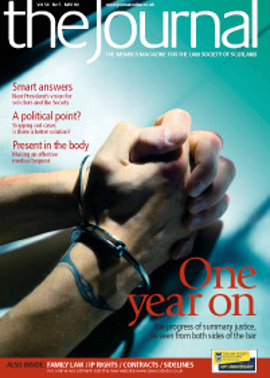Playing politics with the constitution

Somerville v Scottish Minsters 2008 SC (HL) 45 was decided by the House of Lords in October 2007. Reversing the First Division and affirming the Lord Ordinary, Lady Smith, the House held that there existed no statutory time limit applicable to court actions brought against the devolved institutions in Scotland in respect of “acts” beyond their competence.
This decision was unsurprising. Scots law has long confirmed that ultra vires acts are void and have no legal effect. As Lord Rodger of Earlsferry observed in R v HM Advocate 2003 SC (PC) 21, 64: “In this respect Parliament has quite deliberately treated the acts of members of the Scottish Executive differently from the acts of Ministers of the Crown.”
It would be surprising instead if such void “acts” could nonetheless become unchallengeable simply by the passage of time. In 1998, during the passage of the Scotland Bill, the lack of any time limits applying to competency challenges to acts of the devolved institutions was specifically drawn to Parliament’s attention by Lord Hope, speaking as a member of the legislature.
Public law damages
As a general rule, clearly established in English law, a breach of a public law right of itself gives rise to no claim for damages: X (Minors) v Bedfordshire County Council [1995]
2 AC 633, 730F-731B. Damages following ultra vires acts could only be recovered at common law on the basis of first establishing an ordinary claim in tort arising from the circumstances of the case. And Lord Hope has stated that in Scots law too, “the fact that an individual has suffered loss because of an invalid administrative act does not in itself entitle him to be indemnified”: Somerville at para 19.
But statute now expressly provides that the actions or omissions of a public authority which are incompatible with Convention rights may give rise to an award of damages if, “taking into account the principle applied by the European Court of Human Rights in relation to the award of compensation under Article 41 of the Convention ... the court is satisfied that the award is necessary to afford just satisfaction to the person in whose favour it is made”: Human Rights Act 1998, s 8(3)-(4); Scotland Act 1998, s 100(3).
Public law just satisfaction damages differ from private law reparation damages in the nature of the harm which is recognised to sound in damages. Just satisfaction awards in respect of Convention rights breaches may be made in respect of presumed “moral damage” for anxiety or distress, even where the victim of the breach may not be able to point to any specific ill effects. The principles relevant to their quantification also differ. Whereas private law damages are purely compensatory, public law damages may include an exemplary or vindicatory element. Further, whereas private law damages arise as a matter of right where the conditions for their award have been established, public law damages always remain a matter for the discretion of the court.
Time bars and devolved competence
Section 7(5)(a) of the Human Rights Act imposes a long-stop one-year time limit from the date of the act or omission complained of, within which court proceedings must be brought under s 7(1)(a) in respect of an alleged breach of Convention rights. This is, however, subject to any rule imposing a stricter time in relation to the procedure in question. No time limit in relation to a Convention rights challenge as a devolution issue is specified in the Scotland Act. As Lord Rodger of Earlsferry noted in Robertson v Higson 2006 SC (PC) 22, 28: “A time-limit for taking proceedings is not incompatible with the Convention…. Since the Scotland Act does not specify any time within which proceedings are to be taken, the ordinary rules relating to the procedure adopted to vindicate the right in question must apply.”
But there are no time limits applicable to judicial review petitions brought in Scotland, which is the procedure which has usually been adopted in seeking the vindication of Convention rights claims. The matter of undue delay in bringing a matter before the court is left to the discretion of the court under the common law principles of mora, taciturnity and acquiescence. There is no Scottish authority in which this plea has been upheld, in the absence of evidence of acquiescence by the pursuer and prejudicial reliance on the part of the defender, on the ground of delay alone. This therefore leaves the acts of the Scottish administration and legislature under the present law potentially open to challenge by way of judicial review for an indefinite period, regardless of whether the case is brought on Convention rights grounds and whether or not seeking just satisfaction damages.
On the other hand it is clearly within devolved competence for the Scottish administration to introduce time limits within which all judicial review claims have to be brought. It has been within the power of the devolved institutions since their inception to change the law in Scotland by providing for express time limits within which judicial review applications have to be brought, and by applying these general time limits even to actions seeking just satisfaction damages against the Scottish authorities in respect of their Convention-incompatible actions, provided always that such time limits do not contravene the Strasbourg-derived principle that individuals should have access to an “effective remedy” in respect of any Convention rights breaches.
The Scottish Government, which has long made plain its unhappiness with the decision in Somerville, has not been unaware of this. In his statement to the Scottish Parliament on 11 March 2009 the Cabinet Secretary for Justice said: “The UK Government had suggested that we might address the Somerville issue by changing the law on time bar in Scotland more generally. However, that would reduce the rights of many deserving claimants, such as those who suffer from pleural plaques or been injured through the negligence of an employer.”
Three points can be made in relation to the second sentence quoted. First, the application to Convention rights damages claims of the three year period which currently applies to private law claims for personal injuries would not result in reduction of the rights of any existing private law claimants, since this would simply establish parity of treatment between these two categories of case. Secondly, an unworthy insinuation is being made to the effect that all and any who seek damages in respect of the violation of their Convention rights are ipso facto less deserving than those seeking dam ages for personal injuries. Finally, and in any event, quite different rules, principles and procedures already apply in relation to public law damages claims, since these are usually brought in the context of judicial review petitions. The introduction of changes in relation to the time limits applicable to such damages claims need not have any impact on private law delictual damages brought by ordinary action.
The draft Modification Order
Be that as it may, the Scottish Ministers appear to have won the day and exerted sufficient political pressure on the Westminster Government to push through a quite unnecessary amendment to the Scotland Act.
The solution unveiled is for a draft order under s 30(2) of the Act to be laid before both the Scottish and Westminster Parliaments for their approval, prior to its being made by the Privy Council. The draft Scotland Act 1998 (Modification of Schedule 4) Order 2009 would empower the Scottish Parliament to introduce a time bar of one year or less in relation “to any proceedings against the Scottish Ministers or a member of the Scottish Executive that may, by virtue of the Scotland Act, be brought in any court or tribunal by any person” (other than the Law Officers) “on the ground that an act of the Scottish Ministers or of a member of the Scottish Executive is incompatible with the Convention rights”.
“Act” of the Scottish Ministers is said not to include the making of any legislation, but it does include “any other act or failure to act (including a failure to make legislation)”. When the new time limit might begin to run in relation to “failure to act” is left unclear. The new time bar would apply to both civil and criminal proceedings. And yet it will apply only where Convention rights are used as a “sword”, that is to say in cases taken against the Executive by victims of Convention rights breaches, and not as a “shield”, that is to say as a defence in the course of a civil or criminal action brought against an individual defender, respondent or accused by the state.
It is clear, however, that this draft order allows for far more than setting a cap on the bringing of aged claims by prisoners for just satisfaction damages in respect of their slopping out, as was its avowed rationale. Instead it provides for the imposition of a time bar of at most one year in relation to all and any Convention rights claims against the administrative action or inaction of the Scottish Ministers, regardless of whether just satisfaction damages were sought in these actions, and regardless of whether these actions are brought by or on behalf of the apparently deserving (for example the pensioners whose situation was repeatedly mentioned in the Scottish Parliament), as contrasted with the allegedly undeserving (i.e. convicted prisoners).
This change in the law involves, under the guise of limiting prisoners’ rights, a significant reduction in the level of judicial protection afforded to the (Convention) rights of each and every private individual in Scotland vis-à-vis the Scottish Government. And all this is being done without any public consultation, in what looks like a helter-skelter rush to change the constitution to the Scottish Government’s advantage before anyone apparently notices the implications of what is being done. It is playing politics with the constitution and we are all the worse off for it.
A fuller version of this article can be read on www.journalonline.co.uk/extras
In this issue
- Obama's first 100 days
- Playing politics with the Scottish constitution
- Beneficiaries are suffering from the high cost of advice
- Ever forwards
- Shared principles
- A year of debate
- Ask the audience
- Property sales continue to fall
- Where fact makes law
- Giving up the body
- Playing politics with the constitution
- Matrix evolutions
- Make it happen
- View from the top
- Retiring thoughts
- Law reform update
- Phone a friend
- Lighting the way
- Is Big Brother watching too closely?
- Ask Ash
- Selection, the professional way
- A claims pandemic?
- Bumper crop
- A place in the sun?
- Equality redefined
- Taking diligence forward
- Scottish Solicitors' Discipline Tribunal
- Book reviews
- Website review






